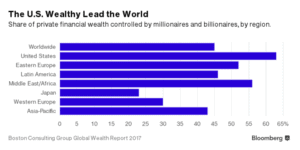
Credit: Bloomberg
Around the world, the number of millionaires and billionaires is surging right along with the value of their holdings. Even as economic growth has slowed, the rich have managed to gain a larger slice of the world’s wealth.
Globally, almost 18 million households control more than $1 million in wealth, according to a new report from the Boston Consulting Group. These rich folk represent just 1 percent of the world’s population, but they hold 45 percent of the world’s $166.5 trillion in wealth. They will control more than half the world’s wealth by 2021, BCG said.
Rising inequality is of course no surprise. Reams of data have shown that in recent decades the rich have been taking ever-larger shares of wealth and income—especially in the U.S., where corporate profits are nearing records while wages for the workforce remain stagnant.
In fact, while global inequality is simply accelerating, in America it’s gone into overdrive. The share of income going to the top 1 percent in the U.S. has more than doubled in the last 35 years, after dropping […]











Some apples and oranges going on here. I have no particular passion one way or the other in this issue, but I’m always bothered when someone tries to make a point using questionable statistical analysis. In this case, it is obvious. In this chart, the US is the only single country represented,. The rest are regional “baskets of countries,” resulting in statistical averaging which dampens down the difference between countries. While it might be true that the US has the most wealth inequality (a figure the relevance of which I think is debatable), this chart does not prove it. To make it apples to apples, instead of the US being selected out, it should be included in a “North America” category as the rest of the world is represented here. But then the conclusion can’t be demonstrated. The only way to do that would be to break the statistics out in a country-by-country basis, rather than a one-country-vs.-the-rest-of-the-world-by region basis. But then (who knows?) Brunei or Qatar or some other place might end up outranking the US in wealth inequality, making the author’s point less dramatically.